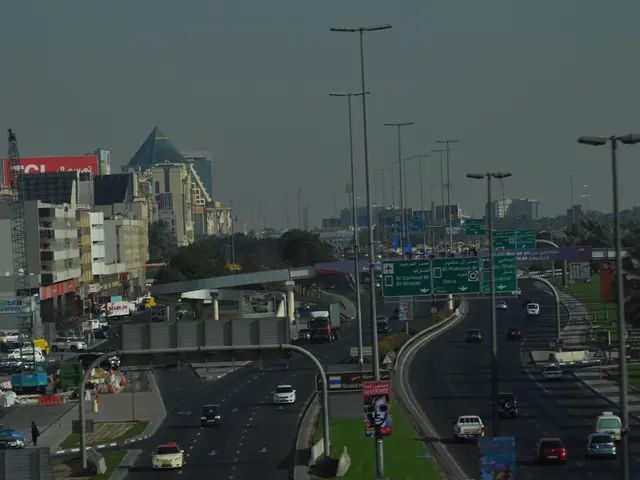Amazon vs. White House: The Tariff Tussle
Trump Phones Bezos Following Amazon's Disclosure of Customs Duties on Imports
Here's the lowdown on Amazon's recent denial of plans to display tariff costs on product prices and the ensuing frenzy. The White House, unimpressed, called out Amazon for being politically motivated.
The Great Divide
According to a report by Punchbowl News, Amazon was considering showing the breakdown of tariff costs next to the final price, but Amazon's spokesperson Tim Doyle squashed that notion, stating emphatically, "The idea was considered by Amazon Haul, the company’s low-cost shopping hub, but was ultimately rejected"[2][4]. Press Secretary Karoline Leavitt from the White House lashed out at Amazon, labeling the move as a "hostile and political act." Leavitt questioned why Amazon hadn't done this under the Biden administration when inflation peaked, implying that Amazon was playing politics[1][2].
A Slugfest in Silicon Valley?
The controversy didn't end there. Senate Minority Leader Chuck Schumer weighed in, urging companies to follow Amazon's initially reported plan to display tariff costs. Schumer reasoned that it would boost public awareness of how tariffs impact consumer wallets, which could in turn bring about policy changes[4]. This episode serves as a testament to the broader political turmoil surrounding trade policies during Trump's reign.
The Amazon Dilemma
Amazon, a major player in the retail market, draws a substantial portion of its sales from smaller, independent retailers heavily dependent on imports. President Trump's tariffs on Chinese imports, set at a whopping 145%, pose a significant challenge for Amazon sellers[1][3]. Some are grappling with the increased costs, choosing to absorb them or temporarily inflate prices, while others are considering stepping back from Amazon's "Prime Day" event.
The Jeff Bezos Question
The fracas has sparked discussions about President Trump's relationship with Amazon founder Jeff Bezos. Leavitt declined to comment on the matter[1]. The question arises: does this hint at a rift between Trump and the Amazon founder, who donated $1 million for Trump's inauguration? Leavitt remained tight-lipped, refusing to discuss the president's relationships with Bezos[1].
Tariffs, trade policies, and politics - it's a complex web that keeps the media and public hooked. Stay tuned as we continue to bringing you the latest updates from the world of business and politics.
- The current tariff tussle between Amazon and the White House, with Amazon denying plans to display tariff costs on product prices, has stirred controversy.
- White House Press Secretary Karoline Leavitt criticized Amazon for being politically motivated, labeling a potential move to display tariff costs as a "hostile and political act."
- Senate Minority Leader Chuck Schumer has urged companies to follow Amazon's initially reported plan, bating its potential impact on consumer awareness and possible policy changes.
- Amazon, a significant player in the retail market, faces a substantial challenge due to President Trump's high tariffs on Chinese imports, with sellers struggling to absorb increased costs or temporarily inflate prices.
- The controversy has also sparked discussions about President Trump's relationship with Amazon founder Jeff Bezos, with questions arising about any potential rift between the two, given that Bezos donated $1 million for Trump's inauguration.
- Entrepreneurship in the tech industry, including businesses dealing in smartphones, gadgets, and technology, is heavily influenced by policy-and-legislation such as tariffs and trade agreements.
- The media and public are closely following the complex web of tariffs, trade policies, and politics, with a growing interest in how these factors impact business and general news.
- White House Press Secretary Karoline Leavitt refrained from commenting on the relationship between President Trump and Amazon founder Jeff Bezos, leaving the public wondering about any potential tension between the two.







